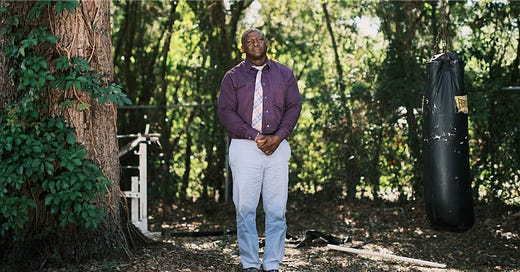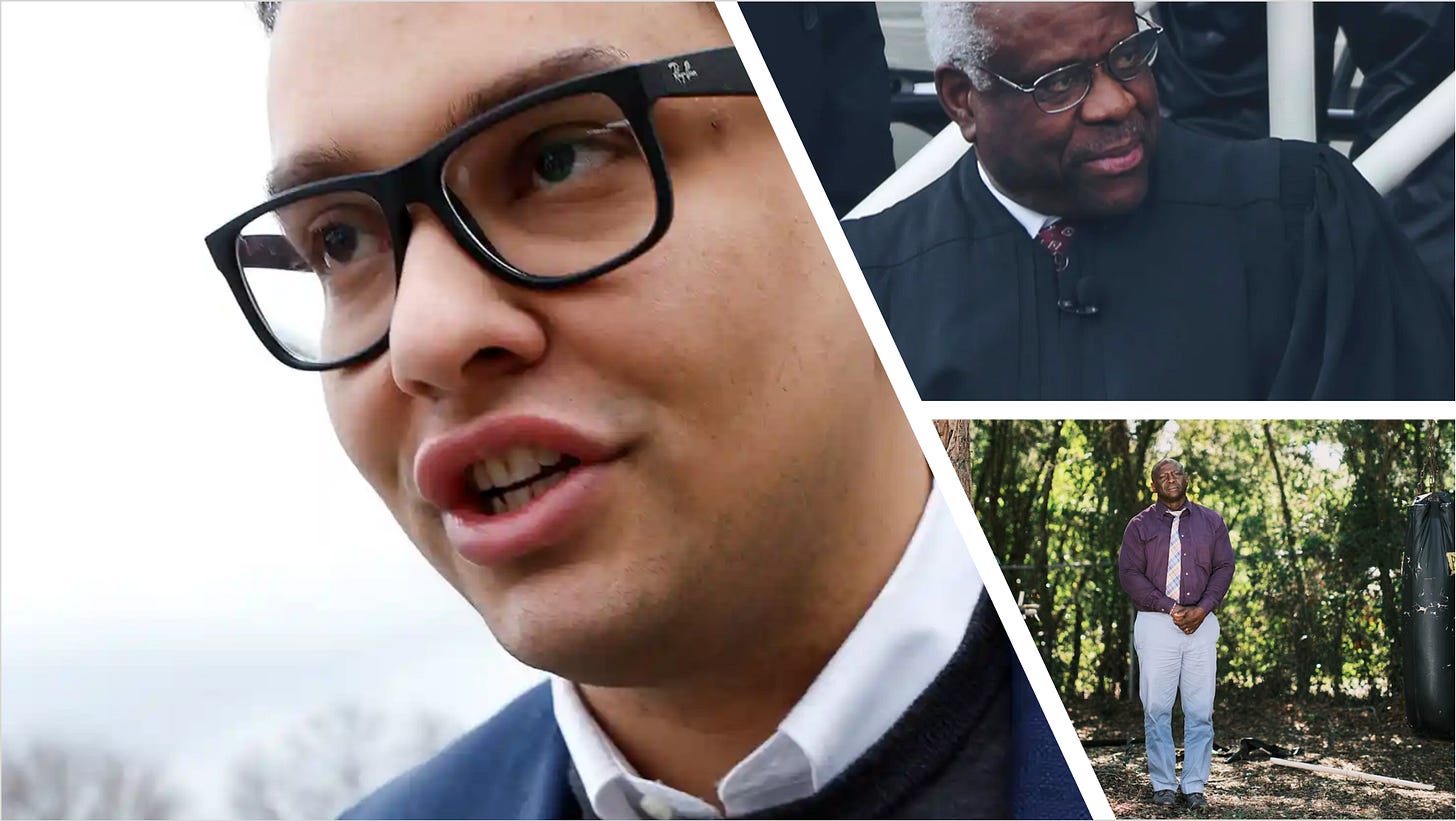Position and privilege are eroding the rule of law
The acidic effects of unsanctioned wrongs and unjust prosecutions
Images: two of these men have not been convicted in a court of law of committing a crime. The other has. But which of them did wrong?
Take three men, two innocent of a charge of, say, theft, and one guilty — a thief. They are all charged that they did on a certain date and in a certain place steal a certain item. They’re arraigned in a court of law. They will be tried on the facts and be found guilty as charged, or acquitted. Two will return home free men. One will go to prison. In a just society, he who is sent to prison will be he who is guilty.
America is a just society, so that is what will happen there, is it not?
Let us change the case a little. Each of them is accused of doing a different wrong this time. Two did so and everyone knows it (they’ve been in the papers) and one didn’t, and can prove it with an official confirmation telling him that what he did was not wrong. The two who wronged will, in our just society, answer for their wrongs, and the man who did no wrong will not be charged.
Wrong. The two who are publicly known to have wronged remain free men. The innocent man is committed for trial, where he is acquitted.
They’re all at home, free men. Getting it right in one case out of three is a good result for justice. Except that, failing in three cases out of three is actually a pretty poor result for justice.
America, we are told, is fighting for democracy. And it’s supporting Ukraine and Taiwan in their fights for freedom. Democracy and freedom. But, if freedom is afforded to those who should answer to the law, or laws are framed such that they don’t need to answer to any law, or laws are contrived for political ends and prosecutions contrived to target those who are even innocent under the law as it stands, and still get prosecuted, where, then, is the rule of law by which democracy and freedom stand? Where is the justice? Where is the sense of justice? Democracy is a model by which restraint on freedom is imposed by law. But it is a fair model only insofar as the restraints imposed by law are imposed equally on all. Only then is there freedom. All else is oppression of some by the rest. All else is no rule of law, but a rule of ambition, avarice and denigration.
In the US state of New York, a senator was elected who was discovered later to have told lies about virtually every aspect of his CV, and a sick dog. Mr Santos lies prodigiously. He’s so like Pinocchio, who eventually turned into an ass, that he’s already a nose ahead in the 2024 elections. Calls for his resignation have been brushed aside, like wood shavings. He’s still a senator.
Meanwhile, just down the coast is Washington DC, which isn’t a US state. Nonetheless, the Supreme Court there is getting the US in a state: a SCOTUS justice maintains he is not culpable for failure to disclose munificent generosity towards him by Republican donor Harlan Crow. He’s wrong.
He says the Supreme Court has not considered any matters before him for judgment involving Mr Crow. He’s wrong on that, as well. Moreover, Mr Crow bought property from Mr Thomas, which, again, was not disclosed as required. Two wrongs don’t make a right, and three certainly don’t. They claim they are dearest friends: he’s probably right on that — and what price friendship?
His defence amounts to his having asked colleagues whether to disclose certain benefits in kind. They should know, they’re lawyers after all. They said not to. Who exactly they were and what exactly they said is not revealed. Clarence is a lawyer too, actually: shouldn’t he know? Mr Thomas, who is appointed to interpret the most complex of laws for his nation, can’t understand an AO-10 declaration. (I recently did a piece on Mr Thomas based on ProPublica’s exposé.)
Finally, we have a real criminal. In certain US states (Florida in particular), there is a clamp-down on election fraud. It seems, so officials say, Mr DeSantis being one, that some ex-convicts are flouting the law by turning up to join the democratic throng.
Problem is, they’re not allowed to. Except, many of them ascertained that they were allowed to, and even got official confirmation of their voter status. No matter, they were arrested, lost their jobs and sent for trial. Where their cases were dismissed. At last, a judge who knew the law.
Conclusion:
- mendacity in seeking a public office of trust: no problem
- a supreme court justice casually asking an undisclosed source about a legal duty resting on him to disclose favours showered upon him: no problem
- receiving official confirmation of your voter status: big problem
Mr George Santos is running again in 2024 (but without party backing). The New York public will decide whether he’s wrong to do that.
Mr Clarence Thomas is not being investigated for his errors. Mr Roberts, his boss, doesn’t think a justice can be wrong — judges are above the law. I think Mr Roberts is wrong. Mr Thomas doesn’t care a fig if anyone thinks he’s wrong.
Mr Peter Washington has been acquitted of all charges and is piecing his life back together. A court of law said he wasn’t wrong. But his life’s in tatters. Mr Washington might as well have been one of the beer cans that Kid Rock took pot shots at.
One rule of law for me. One rule of law for the rest of you. No rule of law for some.
A public scandal, in case you were wondering whether the term still has any meaning, would be if Mr Santos pulled his knickers down in the middle of Broadway. Or Mr Thomas entered court with an Uzi and mowed down the entire bench. Or Mr Washington picked his nose while in the dock.
They say, if at first you don’t succeed, then, try, try again. But trial and error is no method for a justice system. Only the guilty can be insouciant to their fate. None is more insouciant than he who offends with impunity, evades prosecution. For anyone else who has been through the justice system, who has stood trial for a crime they did not commit, they don’t simply need to survive the day in court. They must face the prospect of incarceration and public humiliation every day of the period to trial, which could be six, nine, twelve months. Each day, every single day, you awaken with a knot in your stomach. You can’t eat. To work, you must apply yourself twice as hard as anyone else. You will repeatedly shake yourself out of your thoughts, dwelling on the charge against you. A thousand times a day. You will even be sick, nauseous, weak and incapable of walking. Your knees will give way under you regardless of how strong you are. Not just once, but every few seconds. The charges will haunt you throughout the day and into the night, and hold you awake as you lie there, stiff as a board, teeth clenched. You will take sleeping tablets, and every night, as you pop one in your mouth, you will ask yourself why you don’t just pop the rest of the bottle after it. It is — to say the least — an experience. One that none will ever forget. Acquittal — which may take its own time in coming — will come as relief. And anger will rise. At having had a year of your life taken from you. At having lost your job. At having been propped up on a wall for a greedy prosecutor with vain ambition to take a pot shot at with their blunderbuss. And all despite the evidence of your innocence having been in plain sight the whole time.
That’s a scandal.




